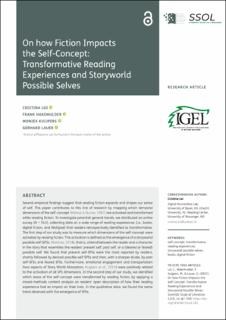| dc.contributor.author | Loi, Cristina | |
| dc.contributor.author | Hakemulder, Frank | |
| dc.contributor.author | Kuijpers, Moniek | |
| dc.contributor.author | Lauer, Gerhard | |
| dc.date.accessioned | 2024-04-08T12:55:14Z | |
| dc.date.available | 2024-04-08T12:55:14Z | |
| dc.date.created | 2024-01-22T09:15:18Z | |
| dc.date.issued | 2023-10 | |
| dc.identifier.citation | Loi, C., Hakemulder, F., Kuijpers, M. & Lauer, G. (2023) On how fiction impacts the self-concept : Transformative reading experiences and storyworld possible selves. Scientific Study of Literature, 12 (1), 44-67. | en_US |
| dc.identifier.issn | 2210-4372 | |
| dc.identifier.uri | https://hdl.handle.net/11250/3125332 | |
| dc.description.abstract | Several empirical findings suggest that reading fiction expands and shapes our sense of self. This paper contributes to this line of research by mapping which temporal dimensions of the self-concept (Markus & Nurius, 1987) are activated and transformed while reading fiction. To investigate potential general trends, we distributed an online survey (N = 543), collecting data on a wide range of reading experiences (i.e., books, digital fiction, and Wattpad) that readers retrospectively identified as transformative. The first step of our study was to measure which dimensions of the self-concept were activated by reading fiction. This activation is defined as the emergence of a storyworld possible self (SPSs, Martínez, 2018), that is, a blend between the reader and a character in the story that resembles the readers’ present self, past self, or a (desired or feared) possible self. We found that present self-SPSs were the most reported by readers, shortly followed by desired possible self-SPSs and then, with a sharper divide, by past self-SPSs and feared SPSs. Furthermore, emotional engagement and transportation (two aspects of Story World Absorption, Kuijpers et al., 2014) were positively related to the activation of all SPS dimensions. In the second step of our study, we identified which areas of the self-concept were transformed by reading fiction, by applying a mixed-methods content analysis on readers’ open description of how their reading experience had an impact on their lives. In the qualitative data, we found the same trend observed with the emergence of SPSs. | en_US |
| dc.language.iso | eng | en_US |
| dc.publisher | John Benjamins Publishing Company | en_US |
| dc.rights | Navngivelse 4.0 Internasjonal | * |
| dc.rights.uri | http://creativecommons.org/licenses/by/4.0/deed.no | * |
| dc.subject | litteraturvitenskap | en_US |
| dc.subject | skjønnlitteratur | en_US |
| dc.subject | bøker | en_US |
| dc.title | On how fiction impacts the self-concept : Transformative reading experiences and storyworld possible selves | en_US |
| dc.type | Peer reviewed | en_US |
| dc.type | Journal article | en_US |
| dc.description.version | publishedVersion | en_US |
| dc.rights.holder | © 2023 The Author(s). | en_US |
| dc.subject.nsi | VDP::Humaniora: 000::Litteraturvitenskapelige fag: 040::Allmenn litteraturvitenskap: 041 | en_US |
| dc.source.pagenumber | 44-67 | en_US |
| dc.source.volume | 12 | en_US |
| dc.source.journal | Scientific Study of Literature | en_US |
| dc.source.issue | 1 | en_US |
| dc.identifier.doi | 10.61645/ssol.181 | |
| dc.identifier.cristin | 2231590 | |
| cristin.ispublished | true | |
| cristin.fulltext | original | |
| cristin.qualitycode | 1 | |

